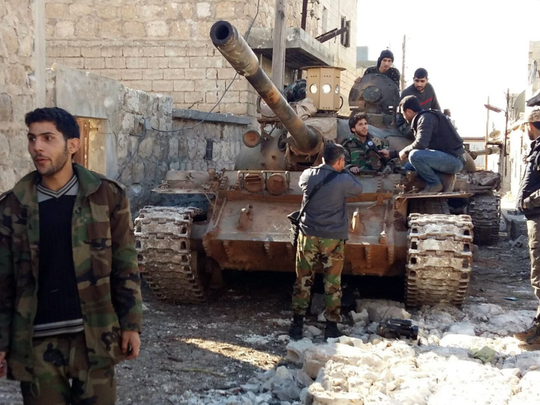
lthough oft-repeated, Saudi Arabia confirmed that it was willing to deploy ground forces to Syria, in what could well be a game changer. Indeed, the potential for direct confrontation between Saudi and Iranian troops that are already engaged on the side of President Bashar Al Assad, would increase with dramatic spillover effects elsewhere throughout the region. Whether other Arab countries, including Egypt, would then back Saudi forces remains to be determined.
On Friday, Brigadier General Ahmad Assiri, who is also the spokesman for the Saudi-led Arab coalition in the War for Yemen, told Al Arabiya television that the Kingdom was “ready to participate in any ground operations that the coalition [against Daesh] may agree to carry out in Syria” during next week’s meeting in Brussels along with other members.
The declaration was made as Russian forces increased their bombardments of non-Daesh strongholds in northern Syria, near Aleppo, and as representatives of coalition nations prepared to meet in Belgium to discuss military strategy.
In as much as a US-led coalition with a full complement of Saudi troops would raise the stakes in Syria, there were two potential — and perhaps inevitable — consequences to consider.
First, such deployments would bring Saudi and other Arab forces — should any decide to join them — in a direct confrontation with the Syrian Arab Army, something that has never happened before. How will the Syrian population react to this is nearly impossible to determine, especially if other Muslim countries participate as well. Will Damascus strengthen its position as Syrians rally behind the flag against fellow Arabs or will it wither at the proverbial vine as Syrians welcome Arab troops? As a corollary to this scenario, especially if coalition troops also enter Syria from Turkey, how would Russia react to the presence of anti-Al Assad forces there and where will the Kurds stand? Already tense, will coalition ground troops further escalate the open conflict between Russia and Turkey or, as it is likely, between Ankara and the Kurds?
Second, and equally important, such deployments will inevitably lead to clashes with Iranian troops and the Hezbollah militia, both of which are fully engaged on the ground and have already suffered significant casualties. While few contemplated such action, possible confrontations, even unintentional, were likely to further highlight sharp differences between the Gulf region’s two main powers.
Saudi Arabia has actively participated in the US-led coalition that has been fighting Daesh in Syria since 2014. Riyadh has already carried out more than 190 aerial missions against Daesh targets. According to the Saudi official, military operations against the Iran-allied Al Houthis in Yemen could not be divorced from an engagement against Daesh, as the coalition needed to combine whatever responses it fathomed against multi-pronged assaults.
Assiri hinted that a pincer movement aimed at squeezing the Arabian Peninsula from the north (Iraq and Syria) as well as the south (Yemen), necessitated adequate responses, both with aerial operations as well as ground campaigns.
Towards that end, affirmed Assiri, and “if there is a consensus from the leadership of the coalition, the kingdom is willing to participate in these efforts because we believe that aerial operations are not the ideal solution and there must be a twin mix of aerial and ground operations.”
It was unclear what level of forces would be committed, though the scales involved require thousands of special forces, which would possibly be deployed in coordination with Turkey. As Turkish President Recep Tayyep Erdogan recently met with Saudi King Salman Bin Abdul Aziz and other top officials to harmonise contemplated reactions to developments in Syria, Assiri’s announcement corroborated that Riyadh was not just focused on Yemen, but displayed its “will to power” even if many failed to grasp its actions.
Critics accused Saudi Arabia of neglecting Syria, where the Free Syrian Army and other anti-government opposition groups bore the brunt of the more recent Russian aerial assaults that inflicted serious damage, even if many others pointed the finger at extending military and financial assistance to various elements engaged in the civil war.
For their part, European Union and American leaders welcomed Assiri’s message, with US Defence Secretary Ashton Carter saying that increased activity by other countries would make it easier for the United States to accelerate its fight against Daesh terrorists. “Saudi Arabia’s willingness to take the lead in marshalling some Muslim majority countries,” declared Carter, “will dramatically facilitate the coalition’s work to defeat extremists.”
To date, the US has conducted the lion’s share of air strikes against Daesh in Iraq and Syria, committed more than 3,600 troops in Iraq and about 50 in Syria, and wished to see the other 24 coalition members put boots on the ground too.












